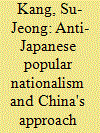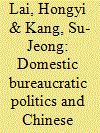| Srl | Item |
| 1 |
ID:
122522


|
|
|
|
|
| Publication |
2013.
|
| Summary/Abstract |
This paper explores the relationship between anti-Japanese popular nationalism and China's approach towards Japan amid Sino-Japanese political tension from 2001 to mid-2006. Among various factors that may affect the relationship, this research focuses on the interaction between the government and the public expressions of anti-Japanese nationalism in China. Throughout most of this period, Sino-Japanese political relations were seriously strained by historical, territorial and other controversial issues, which stirred up anti-Japanese sentiment in China. However, it was only between 2003 and the spring of 2005 that mass anti-Japanese protests were allowed, or at least tolerated, by the Chinese authorities and played a role in Beijing's handling of Japan-related controversies. The paper examines China's domestic political situation during the leadership transition from the third to fourth generation of leaders, which it claims drove the Chinese government's lenient response to popular anti-Japanese protests and enhanced the prospects for popular nationalism to affect the government's approach towards Japan.
|
|
|
|
|
|
|
|
|
|
|
|
|
|
|
|
| 2 |
ID:
128275


|
|
|
|
|
| Publication |
2014.
|
| Summary/Abstract |
One of the outstanding features of China's domestic politics is the prominence of the bureaucracy in the policy-making process. Arguably, bureaucracy is the next major player in the policy-making process in China after the top leaders. In this article, the three following aspects of the role of bureaucracy in the Chinese foreign policy-making process are examined: (1) the structure of the bureaucracy, especially the main agencies of the bureaucracy involved in foreign policy making; (2) the respective responsibilities of these agencies and their roles in the process; and (3) inter-agency coordination including the resolution of conflict among them. It observes that while the Ministry of Foreign Affairs plays a key role in the process, other ministries and bureaucratic agencies have significant and even growing input in an increasing number of functional areas, such as trade, finance, economy, climate change, soft power and military affairs. In addition, coordination among these agencies has become a key in the policy-making process.
|
|
|
|
|
|
|
|
|
|
|
|
|
|
|
|